New York City's only shelter for LGBTQ adults is 'a nightmare,' ex-residents say
- Oops!Something went wrong.Please try again later.
Shnya Unity had been living on the streets of New York City for a year before she moved into Marsha’s House. Unity had heard “horrible things” about the city’s only shelter for LGBTQ adults, but she had nowhere else to go in October 2020, she said.
Unity, a 24-year-old transgender woman from Alabama, ended up spending over six months at Marsha’s House. She said the shelter’s security guards frequently used transphobic slurs and threatened to fight her when she refused to have sex with them. She recalled one guard entering her room and masturbating onto her pillow as other residents filmed, laughing. Unity said she was also spit on twice, once by a guard and once by a staff member.
“They don’t care about what they do to us,” she told NBC News. “It’s just awful.”
When Unity complained about the security guards’ actions to shelter staff, she faced retaliation, she alleged.
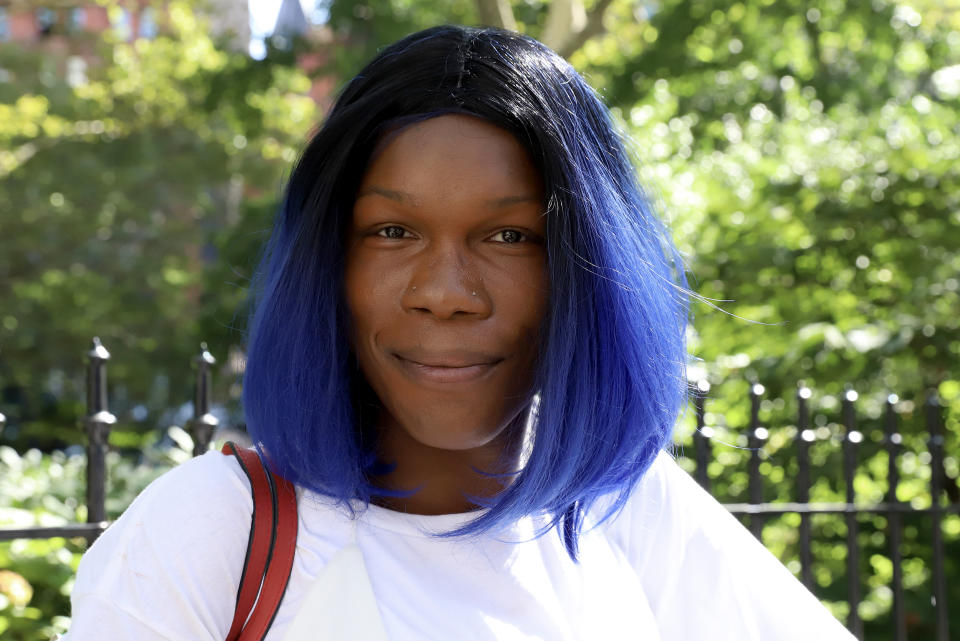
Named after transgender icon Marsha P. Johnson, Marsha’s House is the only shelter in the New York City Department of Homeless Services system dedicated to the LGBTQ community, which experiences disproportionately high rates of homelessness. But advocates and former residents say the shelter is far from a safe haven. Through interviews with six former residents and five former employees, as well as information obtained through court documents and Freedom of Information Law requests, NBC News has uncovered years of alleged abuse, including sexual misconduct accusations against security guards and a former director.
The NYC Department of Homeless Services denied any knowledge of the misconduct described to NBC News by former residents and staff.
“The health and safety of our clients and staff is our number one priority and we take all allegations seriously,” a department spokesperson said. “We provide numerous channels for clients and staff to report problems, but these claims have never been reported and we have no evidence whatsoever to corroborate them.”
From queer 'mecca' to 'nightmare'
Marsha’s House opened in February 2017 in the Belmont area of the Bronx, where the poverty rate is over 40 percent. The 81-bed shelter was a passion project for Rep. Ritchie Torres, D-N.Y., then the first openly gay New York City Council member from the Bronx.
“This shelter can mean the difference between life and death for homeless LGBTQ young adults,” Torres said in a 2017 statement. Torres later became the first gay Afro Latino elected to Congress and still represents the Belmont area.
Through a representative, Torres declined to comment on allegations of wrongdoing at Marsha’s House.
Nationwide, lesbian, gay, bisexual, transgender and queer people face significantly higher rates of homelessness than the general population. LGBTQ youth are twice as likely as their straight, cisgender peers to experience homelessness, according to a 2017 study from Chapin Hall at the University of Chicago. A recent survey from the Williams Institute at UCLA Law suggests LGBTQ adults are at even greater risk: Relative to the straight, cisgender population, three times as many LGB adults and eight times as many transgender adults reported being homeless in the past year.
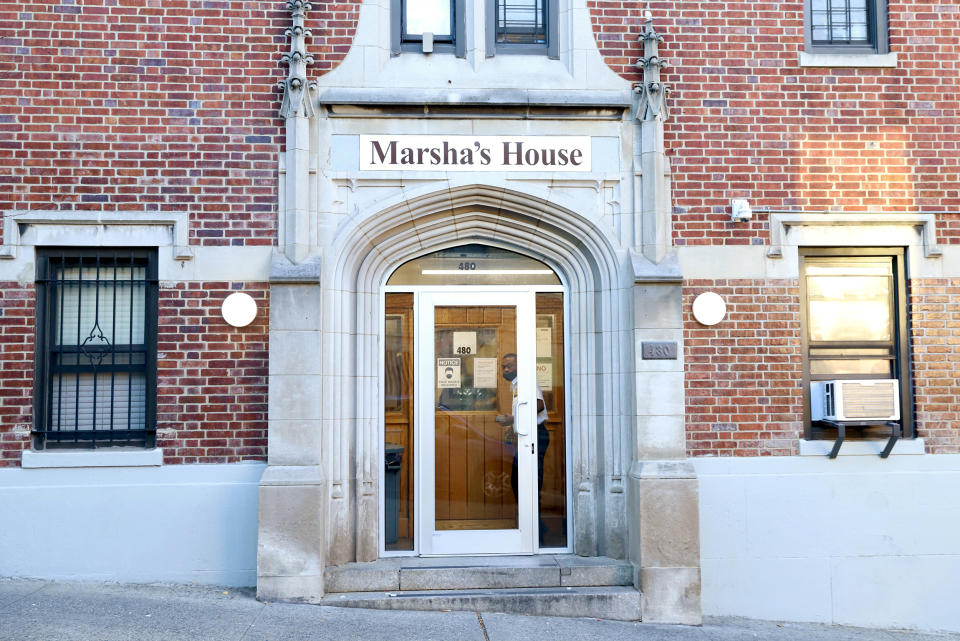
In New York City, homelessness among single adults has been rising for more than a decade, but nearly all of the LGBTQ shelters are for people under 25. Housing providers such as the Ali Forney Center are contracted with the city’s Department of Youth and Community Development, which serves 16- to 24-year-olds.
For older adults and seniors seeking LGBTQ-specific shelter, “there’s almost nothing,” said Sasha Alexander, membership director at the nonprofit Sylvia Rivera Law Project.
Alexander, who uses gender-neutral pronouns, said they were disappointed when DHS opened Marsha’s House to serve only 18- to 30-year-olds.
Yet the age limit at Marsha’s House made sense to Cornelius Wiggins, youth community engagement coordinator at the LGBT Community Center in Manhattan. Wiggins, who also uses gender-neutral pronouns, said they envisioned Marsha’s House as a “transitional program.”
“It seemed like this mecca for queer folks, especially for young people aging out of the youth shelter system,” said Wiggins, who now avoids referring clients to Marsha’s House “unless they ask for it.”
In April 2017, just two months after Marsha’s House opened, the shelter became the subject of a lawsuit. Mariah Lopez, a 32-year-old disabled transgender woman, had persuaded DHS to admit her to Marsha’s House despite the age cutoff. When she tried to enter the shelter, however, staff violated DHS policy by turning her away for having a service dog, Lopez alleged in a pro se lawsuit filed in New York’s Southern District.
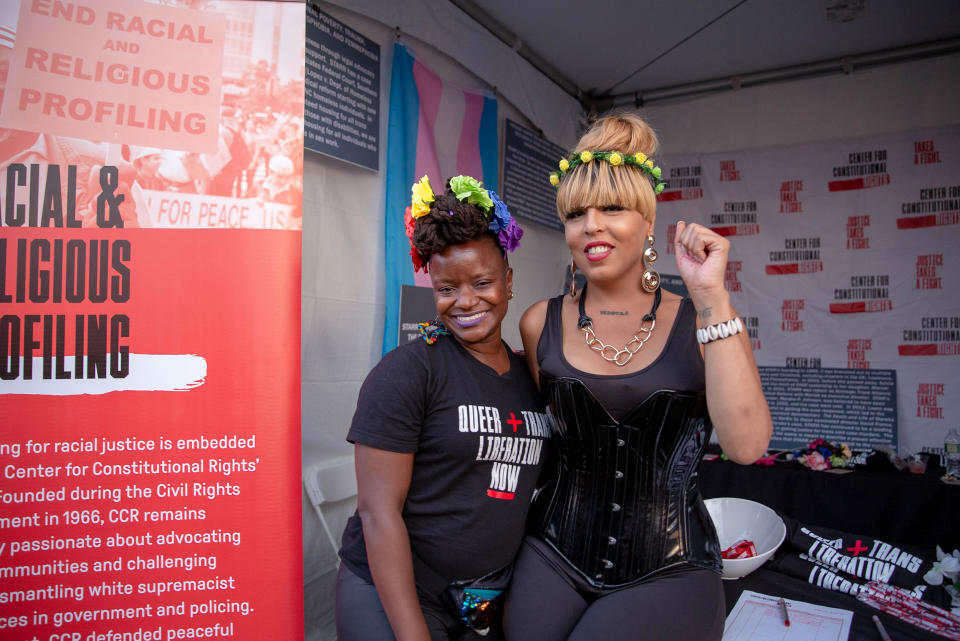
Almost as soon as Lopez was allowed to move into Marsha’s House, she was back in court fighting to stay. In May 2017, in a separate complaint, Lopez said DHS and Project Renewal — the nonprofit the department hired to operate Marsha’s House — transferred her to another shelter to suppress her report of “official misconduct.” Lopez detailed those allegations again in a third complaint, filed in June 2018 to New York’s Supreme Court, describing her time at Marsha’s House as “a nightmare:”
“In late April, [Marsha’s House] shelter director Kaedon Grinnell did make sexual advances towards me; with body language (an erect penis under his clothing which was clearly visible while in my presence, along with facial expressions and gestures such as licking his lips), and by initiating sexually charged conversation …
“Male Project Renewal staff under Kaedon Grinnell flirted with me, and asked questions about my genitals [sic] (lemme see what a sex change looks like”)...
“Employees of the security company [QPS] within the shelter... constantly harassed me verbally calling me him/he/it. Male QPS staff did bring myself and other shelter residents illegal drugs (including opiates, marijuana and cocaine), and did engage in prostitution and other sexual contact with shelter residents openly.”
Lopez’s lawsuit included screenshots from the dating app Plenty of Fish, allegedly showing a QPS security guard propositioning another Marsha’s House resident on May 14, 2017.
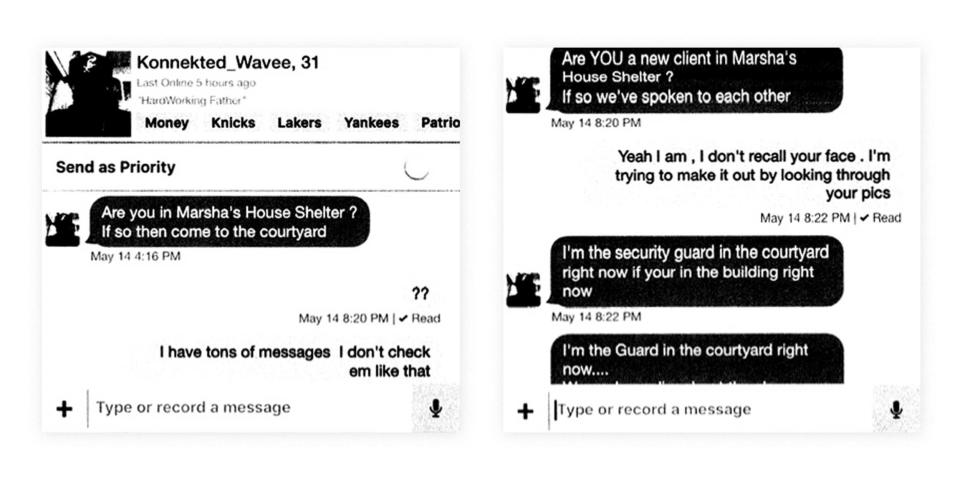
“Are you in Marsha’s House shelter ? If so then come to the courtyard,” the QPS employee wrote, according to the screenshots. “I’m the security guard in the courtyard right now if your in the building.”
The recipient of the messages told NBC News the exchange was “very weird and uncomfortable” and noted that her Plenty of Fish profile identified her as a lesbian. She asked that her name not be published because she doesn’t want her stay at Marsha’s House to become public.
Zulema Tiburcio, a former case manager at Marsha’s House, said she remembered the resident confiding in her about the guard’s behavior. The resident told Tiburcio that the guard had also approached her when she was smoking alone in the courtyard at night.
“He was coming close to her and trying to ask her questions. He was freaking her out, basically,” Tiburcio said. “The next day, she came up to me. She asked me if I would go to the police with her, and I did.”
Tiburcio said she accompanied the resident to the police station, but she doesn’t recall a report being filed. She said the security guard was transferred to another shelter.
In spring 2019, Mariah Lopez reached confidential settlements with QPS and Project Renewal. When asked about Lopez’s suit and other allegations from former residents and staff at Marsha’s House, QPS did not respond, and Project Renewal denied any knowledge of the alleged misconduct.
“We designed Marsha’s House with DHS to ensure that residents are treated with respect and kindness, hiring staff from within the community and supporting clients to lead their most fulfilled lives,” Project Renewal spokesman Zac Roy said in an email. “We investigate all complaints and grievances, have a process that encourages residents to file them and makes it easy to do so. The serious allegations here were never brought to the attention of Project Renewal or any other entity to our knowledge.”
Kaedon Grinnell, who left Project Renewal last October, declined to comment.
'Meth in the microwave'
In late 2019, Project Renewal promoted Grinnell to vice president of programs and hired a new director for Marsha’s House. In December of that year, Jazmine Perez, a transgender woman, became the first openly LGBTQ person to lead the shelter. Perez said her own experience as a homeless teenager led her into social work.
Although Marsha’s House had switched from QPS to SERA Security Services, Perez said guards continued to harass the shelter residents. Residents told Perez security staff were following them into their rooms after they showered and watching them change.
“Clients would report that the guards were constantly gawking and staring at them, and I kind of caught a couple of them doing it, too,” Perez told NBC News. “The security guards that they were hiring were cisgender heterosexual folks, most of them not necessarily from this country, and they did not understand or respect LGBTQ identities.”
Unity, the former resident, said Marsha’s House security guards “loved to misgender people” and use slurs like “man with a p----” and “woman with a d---.” She said that the guards asked her for sexual favors, and that when residents got into fights, they took bets on who would win instead of intervening.
Three former Marsha’s House case managers, including Tiburcio, said they were told about security guards engaging in sexual activity with residents. One ex-staffer said they reported an incident to the then-director of social services, but Tiburcio and the other said they didn’t because they hadn’t witnessed the incidents firsthand. All three former case managers said administrative and social services staff left the shelter at 4 p.m. and relied on overnight shift summaries from residential aides and security.
“There would be a lot of things that I would hear about that would not make it to those shift summaries,” said Tiburcio, who worked at Marsha’s House from 2017 to 2020.
The shelter’s former director of social services declined to comment.
Andrew Rinehults, a bisexual man from Baltimore who lived at Marsha’s House from January 2020 to April 2021, recalled both security and staff being indifferent to violence among residents. Rinehults said he once heard another resident get his jaw broken — “a clenching, spine-tingling sound” — and beg shelter workers for help.
“‘Oh, you want me to call EMS? It’s a block away. Go.’ And they waved him off,” Rinehults alleged.
Rinehults, 27, said he was sexually assaulted last year after security allowed a nurse to enter his dorm room. Rinehults needed treatment for bleeding abscesses on his torso but said the nurse tried to examine his genital area.
“He’s like, ‘Come on, let me take a look.’ And I said, ‘No, I’m good,’” Rinehults recalled. “He tried reaching for me, like reaching out to grab me, and I hit him in his mouth.”
Rinehults said he reported the assault to his case manager, Lo Anderson. Anderson, who uses gender-neutral pronouns, corroborated Rinehults’ story and said it was “very out of the ordinary for medical staff” to go into the dorms. Anderson said they confronted the nurse, who stopped working at the shelter shortly afterward. The Project Renewal spokesman, however, said it had no record of a male nurse employed at Marsha’s House in 2021.
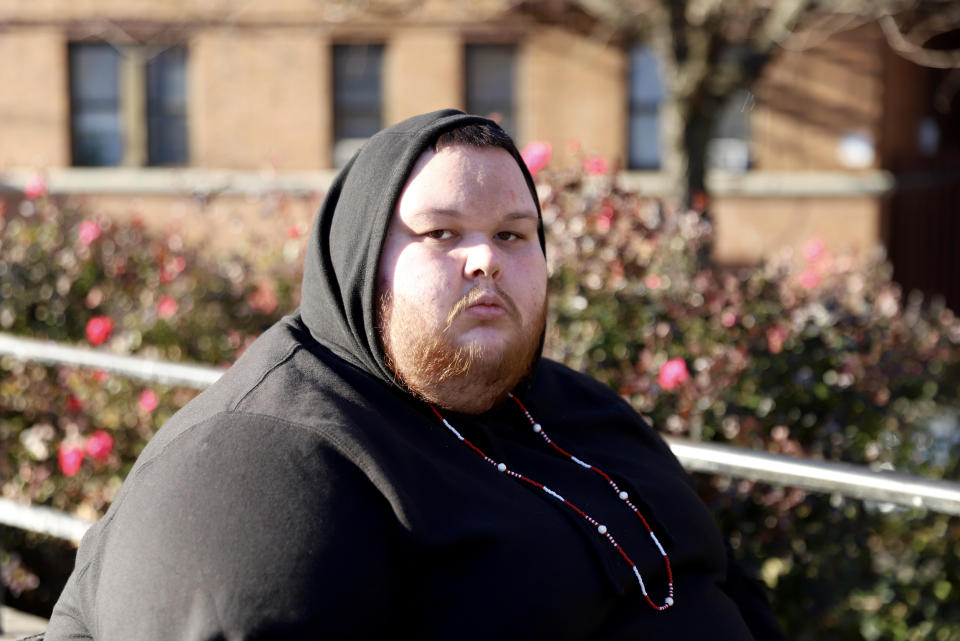
Rinehults and Unity both said they observed widespread substance abuse among shelter residents, including meth, heroin, cocaine and a type of synthetic marijuana called K2. Perez admitted the staff had trouble preventing drug and alcohol use, adding that she came across syringes, bottles and “makeshift ashtrays” in the dorms.
“There was this one client who was actually making his own crystal meth in the microwave,” Perez said. “He caused the microwave to explode, and he ran out of the building.”
As for the security team, Perez said her supervisors at Project Renewal ignored reports of guards mistreating Marsha’s House residents and failed to provide regular “LGBTQ 101” trainings to security staff.
“It’s almost as if my concerns would go in one ear and out the other, because they would just allow them to stay,” said Perez, who lacked the authority to fire guards herself.
When Marsha’s House changed security contractors a third time in July 2020 — from SERA to Winfield — Perez said she pushed to hire fewer guards and replace them with operations staff.
“I didn’t think they needed all of those security guards,” Perez explained, noting that there were as many as 10 guards on duty at any given time. “Yeah, they didn’t listen to me.”
Project Renewal fired Perez in September 2020. Perez said she was dismissed for “being mean” to caseworkers and other shelter employees.
SERA did not respond to NBC News’ requests for comment, and Winfield declined to comment. Project Renewal said in a statement that Marsha’s House has provided quarterly sensitivity training to all staff, including security, since the shelter opened.
'Justice needs to be served'
The current Marsha’s House director, Jacqueline Luna, took over last January. Luna said she had not received any reports of guards requesting sexual favors and was unfamiliar with the allegations against Grinnell.
“I think that our clients are supported in ways that are culturally competent and sensitive where they are right now,” Luna said.
Luna has been at Marsha’s House since it opened, first as a caseworker and later as assistant director under Perez. When asked if she had ever seen violence break out at the shelter, Luna said, “I don’t want to say violence. I know that people have, you know, argued and tensions have arised.”
New York City Police Department records reveal officers were called to Marsha’s House over 225 times from February 2017 to September 2021 — about once a week — including for at least five reports of felony assault during that time period.
Diamond Wynn, a former housing specialist and case manager, described Marsha’s House as “an extremely difficult place to be, whether you’re a client or a staff member.”
“In my time at Marsha’s House, I attempted suicide twice,” said Wynn, who was hired at the shelter before it opened and quit in 2021. “I dealt with a lot of abuse from clients, a lot of abuse from staff, a lack of support, and it impacted my mental health.”
Wynn told NBC News that escalating complaints at Marsha’s House “ended up being a waste of time more often than not.”
“You report it to a supervisor, and the supervisor just asks the person in question, ‘Did you do this?’ The person says, ‘No.’ They’re like, ‘OK, well, if you did, just in case, don’t do that thing,’” Wynn said.
The New York City Commission on Human Rights has been in contact with Marsha’s House since at least Aug. 23, 2019. An internal document shows the commission led a Trans101 Workshop for Marsha’s House staff on that date, responding to concerns from residents.
“The commission cannot provide details on ongoing investigations,” Alicia McCauley, the commission’s press secretary, told NBC News.
Last June, the New York City Public Advocate toured Marsha’s House after hearing of issues with staff, according to Kim Watson-Benjamin, LGBTQ coordinator for the advocate’s office. In a statement to NBC News, a spokesman for the Public Advocate called the allegations against Marsha’s House “alarming and unacceptable:”
“After our office alerted the Department of Homeless Services, visited the site, and spoke to residents, it became clear that both specific and systemic changes were urgently needed to protect and support the youth there. We have met with their leadership and worked to demand and direct reforms and improvements together with our partners in government.”
Zac Roy, the Project Renewal spokesman, said in his email that the nonprofit “enjoys a good working relationship” with the Public Advocate’s Office and noted that last October, “Project Renewal expanded sensitivity training to include an additional session for each new employee within seven days of starting at Marsha’s House.”
LGBTQ activists said they’ve spent years drawing attention to the problems at Marsha’s House, only to be brushed off by Project Renewal and the Department of Homeless Services. Sean Coleman, founder of the Bronx-based LGBQ nonprofit Destination Tomorrow, described the process as “disheartening.”
“There should have been more LGBT community input once they began to operate,” Coleman said of Marsha’s House. “Now it feels like they’ve gotten the money, so they don’t really care to do any better.”
Tax filings show Project Renewal received an average of $74 million in government funding each year from 2017 to 2019. Its contract to operate Marsha’s House was recently renewed through June 2025 for a total of $25.6 million, according to the city’s Department of Social Services.
When asked about the treatment of LGBTQ residents within its facilities, DHS told NBC News via email in September that the department strives to create a “welcoming and inclusive environment” for all those it serves. DHS also touted having had “several” conversations with the Sylvia Rivera Law Project, writing, “We have been open and responsive and collaborative.” Alexander said the nonprofit walked away from talks with DHS in summer 2020 after the agency offered little follow-through.
Alexander is calling on the city to establish “an outside body that essentially holds DHS accountable, because they’re not going to do it themselves.”
While the DHS ombudsman monitors complaints, the reporting system is a “closed loop,” Chinyere Ezie, a senior attorney at the Center for Constitutional Rights, said.
“Their policy is to send them back to the shelter and the shelter directors — the very people who are the subject of those complaints,” Ezie said of the complaints.
Ezie represented Mariah Lopez in her lawsuit against Marsha’s House and helped secure a settlement with DHS this past fall. The settlement requires DHS to increase transparency around allegations of sexual misconduct and educate shelter staff and vendors about LGBTQ rights. It will also create dedicated shelters for transgender and gender-nonconforming adults in Brooklyn, Manhattan, Queens and the Bronx.
“This settlement represents a turning point in New York City’s treatment of trans and gender nonconforming people experiencing homelessness,” Ezie said in a press release in November.
In a statement on the settlement, DHS said, “We thank Mariah Lopez for her leadership on this issue.”
Rinehults and Unity have both secured permanent housing since leaving Marsha’s House. Unity moved into her own apartment in December and said she’s trying to clear her mind of the “trials and tribulations” she endured at the city’s only shelter for LGBTQ adults.
“Justice needs to be served for what they were doing at Marsha’s House,” Unity said.
CORRECTION (Feb. 9, 2022, 12:40 p.m. ET): A previous version of this article misspelled the last name of a former Marsha’s House resident. He is Andrew Rinehults, not Andrew Rynehults.

